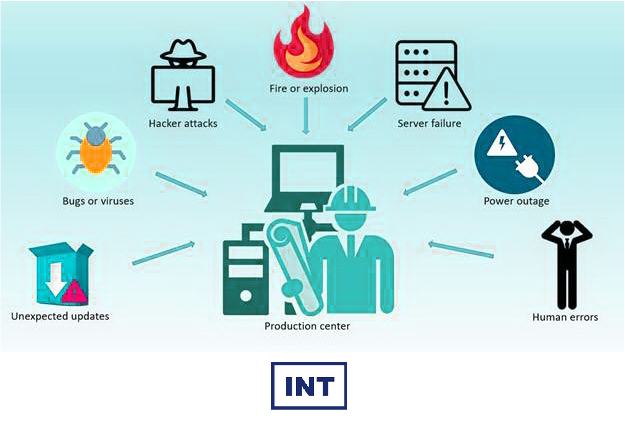Importance of Disaster Recovery Planning
In our everyday lives, we try our level best to take care of ourselves, our loved ones, our surroundings, and our overall environment, but things don’t always go planned as they are thought to be. Like natural disasters, it does not matter how many preventive measures you take to avoid them, a disaster like an earthquake will happen if it has to and the only thing you can do to protect your family from such horrible incident is to always stay well prepared for it. Same is the case with businesses, if your company has gone through a critical disaster and you hadn’t taken any preventive measures before, then get ready to face some terrible financial situations, low sales, no profit margins, and totally mismanaged operations. This is the reason why companies are spending so much on their disaster recovery plans. To understand it better let’s first realize the importance of data and its protection for any firm.
The Importance of Data for Any Business:
Data is the primary element which triggers sales, revenue, demand, purchases, and all other relevant terms. Data contains information about all the transactions that are being made, the entire customer’s data, their contact numbers, data of suppliers, retailers, marketing teams, etc. Just imagine if suddenly all these contacts that you had in one place, suddenly go out of your control, what would happen? All at once, you will be back to zero, right from where you started, or if you got lucky and got some of the data recovered, still your company will not be in a situation to carry on its operations, and you will have to spend a huge amount to bear the losses.
How severely can data loss damage my company’s reputation?
The amount of damage your company will face depends entirely on the following factors like the type of business you are in, the amount of data involved during transactions, the time you had spent and so many other aspects, but the thing that’s common to all businesses is the fact that data loss in any way can easily put your business out of the market. Imagine your credentials or proprietary information gets lost, where will your company stand at that time? We’ve seen people saying that these are all extreme cases and happen to big companies only; however, that’s not the situation. Smaller companies are more vulnerable to data loss as compared to big ones because their IT systems are not well secured and most of them don’t even think of having a disaster recovery plan.
What is a data recovery plan and how can I build one for my company?
A data recovery plan is a documented plan that refers to a set of actions which will be taken before or after any disaster like data loss. We cannot always avoid these disasters but the best we can do is to prepare these data recovery plans for our companies in order to restore operations and minimize the potential damage these disasters can bring otherwise.
Let’s discuss a few benefits of having a complete data recovery plan for your company:

Increased Security:
While formulating such data recovery plans, you first need to find out the loopholes about how your data that can be attacked, this way you will be able to locate the potential bugs in your system and will focus on improving the security of your overall company’s assets and resources.
Minimal Recovery Time:
If such a disaster has happened, and you already have a recovery plan available in hand, then you can easily jump towards the solution instead of whining about the loss. This approach will minimize the recovery time and your company can easily start off the daily operations.
Preventing Legal Issues:
A business’s main asset is its identity, in legal terms, if for any reason that identity gets hit, that business or company will not be able to survive for more than a month or even less. Therefore, it is of extreme importance to secure all your property documents, to prevent any legal liabilities in case of data losses.
Making the Right Decisions:
Following a sound recovery plan which was developed in good situations is far better and helpful than making it when the loss has happened and the company is already suffering a huge failure, that it cannot bear any other financial burdens. This way, having a disaster recovery plan saves you from making the wrong choices at the last moment.
Greater Customer Retentions:
As discussed above, the occurrence of the customer’s data loss can severely hit any company’s reputation. Customer these days are not forgiving in terms of a service break down or downtime. Therefore it is so important for business owners to secure all of their customer’s data as a first priority, because otherwise once the customers lose their trust in your brand, then definitely they are not going to place their orders again. A recovery plan, therefore, gives the best solutions on how to retain your customers and earn their trust.
Increased Employee Productivity:
The better you manage your resources, the better your profit margins get. In successful firms, it is evident that who will perform which tasks and who will be held accountable if anything goes wrong. Similarly, it is advisory to assign all those tasks and duties in advance to respective individuals to increase overall company’s productivity. Also while making a disaster recovery plan, normally two to three resources are trained for doing the same task, so that the progress of the company doesn’t stop in case of any turnover or absenteeism.
Disaster planning not only just prepares your organization for worst-case scenarios or provides strategies on how to minimize your losses while continuing all the remaining operations but also it makes your company resilient and stronger in terms of strategic management, decision making, profitability, and customer retention. In the world of business, companies who consider disaster planning as one of their crucial tasks, scale and position themselves in a much better way as compared to those who rely on last-minute planning.
